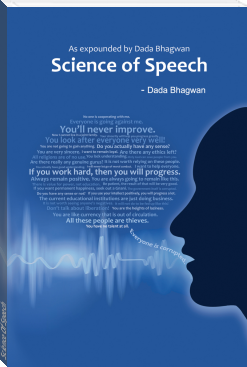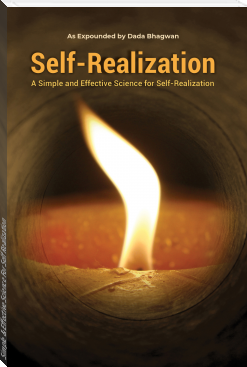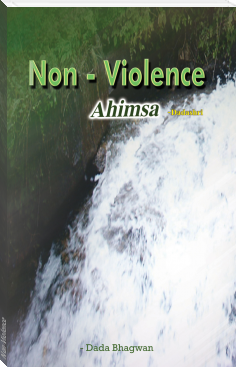Science Of Speech - Dada Bhagwan (rm book recommendations txt) 📗

- Author: Dada Bhagwan
Book online «Science Of Speech - Dada Bhagwan (rm book recommendations txt) 📗». Author Dada Bhagwan
As Expounded by Dada Bhagwan
Science of Speech
Originally compiled in Gujarati by: Dr. Niruben Amin
Trimantra
The Three Mantras That Destroy All Obstacles in Life
Namo Vitaraagaya
I bow to the Ones who are absolutely free from all attachment and abhorrence
Namo Arihantanam
I bow to the living Ones who have annihilated all internal enemies of anger, pride, deceit and greed
Namo Siddhanam
I bow to the Ones who have attained the state of total and final liberation
Namo Aayariyanam
I bow to the Self-realized masters who impart the Knowledge of the Self to others
Namo Uvazzayanam
I bow to the Ones who have received the Knowledge of the Self and are helping others attain the same
Namo Loye Savva Sahunam
I bow to the Ones, wherever they may be, who have received the Knowledge of the Self
Eso Pancha Namukkaro
These five salutations
Savva Pavappanasano
Destroy all demerit karma
Mangalanam Cha Savvesim
Of all that is auspicious
Padhamam Havai Mangalam ||1||
This is the highest
Om Namo Bhagavate Vasudevaya ||2||
I bow to the Ones who have attained the absolute Self in human form
Om Namah Shivaya ||3||
I bow to all human beings who have become instruments for the salvation of the world
Jai Sat Chit Anand
Awareness of the Eternal is Bliss
Who is Dada Bhagwan?
In June 1958, around 6 o’clock one evening, amidst the hustle and bustle of the Surat railway station while seated on a bench, ‘Dada Bhagwan’ manifested completely within the sacred bodily form of Ambalal Muljibhai Patel. Nature revealed a remarkable phenomenon of spirituality! In the span of an hour, the vision of the universe was unveiled to him! Complete clarity for all spiritual questions such as, ‘Who are we? Who is God? Who runs the world? What is karma? What is liberation?’ etc. was attained.
What He attained that evening, He imparted to others through his original Scientific experiment (Gnan Vidhi) in just two hours! This has been referred to as the Akram path. Kram means to climb up sequentially, step-by-stepwhile Akram means step-less, a shortcut, the elevator path!
He, himself, would explain to others who Dada Bhagwan is by saying, “The one visible before you is not Dada Bhagwan. I am the Gnani Purush and the One who has manifested within is Dada Bhagwan who is the Lord of the fourteen worlds. He is also within you, and within everyone else too. He resides unmanifest within you, whereas here [within A. M. Patel], He has manifested completely! I, myself, am not God (Bhagwan); I also bow down to the Dada Bhagwan who has manifest within me.”
*****
The Current Link to Attain Self-Realization
After attaining the Knowledge of the Self in 1958, absolutely revered Dada Bhagwan (Dadashri) traveled nationally and internationally to impart spiritual discourse and Self-realization to spiritual seekers.
During his lifetime itself, Dadashri had given the spiritual power to Pujya Dr. Niruben Amin (Niruma) to bestow Self-realization to others. In the same way, after Dadashri left his mortal body, Pujya Niruma conducted spiritual discourses (satsang) and imparted Self-realization to spiritual seekers, as an instrumental doer. Dadashri had also given Pujya Deepakbhai Desai the spiritual power to conduct satsang. At present, with the blessings of Pujya Niruma, Pujya Deepakbhai travels nationally and internationally to impart Self-realization as an instrumental doer.
After Self-realization, thousands of spiritual seekers prevail in a state free from bondage and dwell in the experience of the Self, whilst carrying out all their worldly responsibilities.
*****
Note About This Translation
The Gnani Purush, Ambalal M. Patel, also commonly known as ‘Dadashri’ or ‘Dada’, gave spiritual discourses that were in the form of answers to questions asked by spiritual aspirants. These discourses were recorded and compiled into books by Pujya Dr. Niruben Amin in the Gujarati language.
Dadashri had said that it would be impossible to translate His satsangs and the Knowledge about the Science of Self-realization word for word into other languages, because some of the meaning would be lost in the process. Therefore, in order to understand precisely the Akram Science of Self-realization, He stressed the importance of learning Gujarati.
However, Dadashri did grant His blessings to translate His words into other languages so that spiritual seekers could benefit to a certain degree and later progress through their own efforts. This book is not a literal translation, but great care has been taken to preserve the essence of His original message.
Spiritual discourses have been and continue to be translated from Gujarati. For certain Gujarati words, several translated words or even sentences are needed to convey the meaning, hence many Gujarati words have been retained within the translated text for better understanding. Where the Gujarati word is used for the first time, it is italicized, followed by a translation explaining its meaning in parenthesis. Subsequently, only the Gujarati word is used in the text that follows. This serves a two-fold benefit; firstly, ease of translation and reading, and secondly, make the reader more familiar with the Gujarati words, which is critical for a deeper understanding of this spiritual Science. The content in square brackets provides further clarity regarding the matter, which is not present in the original Gujarati content.
This is a humble attempt to present to the world, the essence of His Knowledge. While reading this translation, if there is any contradiction or discrepancy, then it is the mistake of the translators and the understanding of the matter should be clarified with the living Gnani to avoid misinterpretation.
*****
Special Note to the Reader
The Self is the Soul (Atma) within all living beings.
The term pure Soul is used by the Gnani Purush for the awakened Self, after the Gnan Vidhi. The word Self, with an uppercase ‘S’, refers to the awakened Self which is separate from the worldly-interacting self, which is written with a lowercase ‘s’.
Wherever Dadashri uses the term ‘we’, ‘us’, or ‘our’, He is referring to Himself, the Gnani Purush.
Similarly, the use of You or Your in the middle of a sentence, with an uppercase first letter, or ‘You’, ‘Your’ in single quotes at the beginning of the sentence, refers to the state of the awakened Self or Pragnya. This is an important distinction for the correct understanding of the difference between the awakened Self and the worldly-interacting self.
Wherever the name ‘Chandubhai’ is used, the reader should substitute his or her name and read the matter accordingly.
The masculine third person pronoun ‘he’ and likewise the object pronoun ‘him’ have been used for the most part throughout the translation. Needless to say, ‘he’ includes ‘she’ and ‘him’ includes ‘her’.
For reference, a glossary of all the Gujarati words is either provided at the back of this book or available on our website at:
http://www.dadabhagwan.org/books-media/glossary/
Editorial
Every human being from the moment he awakes is involved in an incessant interaction of speech. Some even talk in their sleep. Speech interaction has two outcomes: sweet and bitter. Interactions that are sweet are palatable. The bitter ones are not palatable. The Gnanis can show us ways to accept both with equanimity. Gnani Purush Dadashri gives us many keys to deal with situations involving speech in our everyday living.
People have asked Dadashri all kinds of questions about various topics, from simple and obvious to profound, from straightforward to ridiculous. His response had been a steady stream of spontaneous answers that quelled the questioner’s inquisitiveness with greatest satisfaction. People could discern love, compassion and ultimate truth in his every word.
Dadashri, with gentle affection, would tell all those that came to him to, ‘Ask, ask and get all your puzzles solved. Ask anything and get your work done. If you do not understand, ask again and again without hesitation. It is not your mistake if you do not understand, but the inadequacy of the person giving the answers.’
If a person dismisses a question by telling you that the answer is too subtle and beyond one’s comprehension, then it would constitute deceit. Too often, people tend to dismiss questions to which they have no answers, by blaming the seeker’s inability to understand.
If a person has heard or read any of Dadashri’s speech in detail, then he would not fail to see what a true Gnani should be. The true Gnani has absolute unity of the mind, speech and conduct. He is the manifestation to the enlightened One. A person would also undoubtedly recognize what is not authentic.
This book will help the reader to resolve problems involving interpersonal communication through speech. It is also an instructional guide to improve one’s speech so that it is not offensive and hurtful. The reader will be enlightened about the repercussions of a single negative thought about anyone. One can learn how to be free from conflict in all one’s relationships, at home and outside.
Dadashri gives us tremendous insight into the fundamental and subtle principles that govern speech. He gives us practical solutions of how to purify verbal interaction with our friends and family so that it hurts no one. Dadashri has a knack, through the numerous ways he illustrates a point, for making the reader feel that it is the reader’s life that is the subject of conversation. His solutions reach the heart directly and lead to liberation.
It is extremely difficult to recognize a Gnani Purush; it requires expertise and skill to distinguish a real diamond. In the same way, a spiritual eye is needed to recognize the enlightened One, Gnani Purush Dadashri. Dadashri’s speech, which was uttered only for the salvation of others and nothing else, will continue to illuminate the path of liberation for generations to come. The Gnani’s speech is so powerful that within just one hour, it bestows upon the seeker, the experience of the Self.
- Dr. Niruben Amin
Science of Speech
Speech in Worldly Interactions
1. Forms of Hurtful Speech
Questioner: The tongue says one thing at one time and something else at another time.
Dadashri: The tongue is not at fault. The tongue constantly lives and works within the confines of the thirty-two teeth. It does not rebel or fight back. The tongue is fine, but it is we, the organizers, who are awkward and at fault. The fault lies with us.
The tongue is very good. Although it lives between the thirty-two teeth, does it ever get crushed or bitten? It gets bitten when we are eating and our chit (the component of the mind composed of knowledge and vision that can wander outside) has gone somewhere else. The chit only wanders when we are inattentive. If the chit stays focused on the task at hand, the tongue will function well, but it gets bitten when the organizer is inattentive.
Questioner: Please help me control my tongue because I talk too much.
Dadashri: I too, talk all day long. As long as your speech does not hurt anyone, there is nothing wrong with talking.
Questioner:





Comments (0)